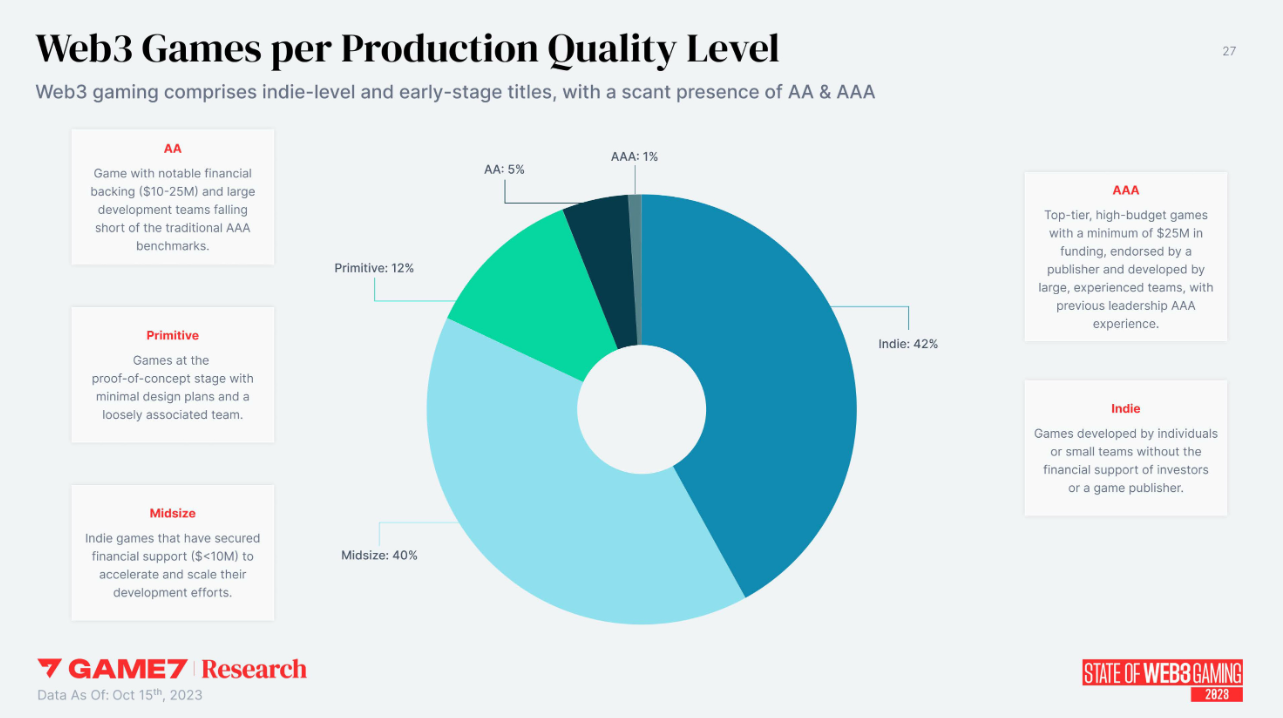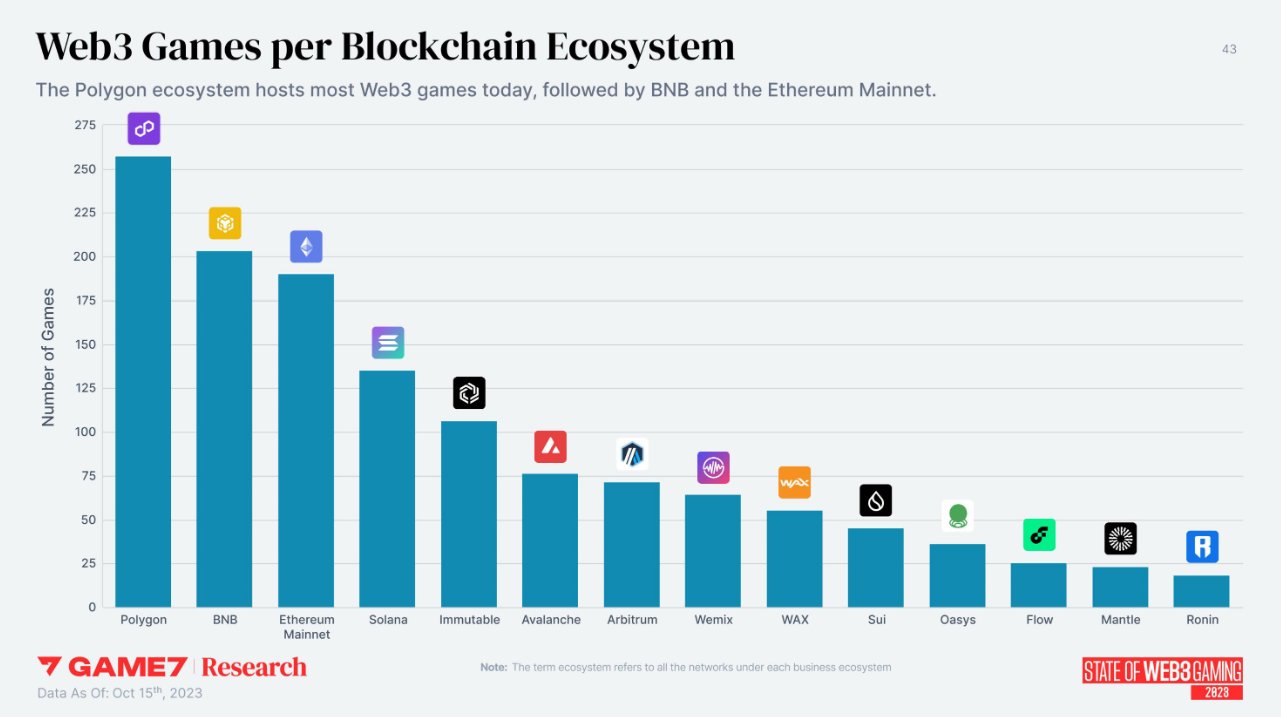While a fledgling industry, blockchain gaming has already faced massive challenges—resulting in a swath of games being put on indefinite pause by their respective developers, while others switch chains.
In 2022, a staggering 157 blockchain games were “halted” or otherwise stopped development, while another 43 titles were halted in 2023, according to a new Game7 report on the state of the Web3 gaming industry. Game7 is a decentralized community or DAO focused on blockchain gaming adoption.
Game7 core contributor George Isichos told Decrypt that the blockchain or “Web3” games that stopped development this year struggled to get financial support and were generally titles that were established before 2021.
Financial troubles trip up games
Most of the blockchain games that stopped development or live support this year were also mainly from very small studios, whereas very few “AA” or “AAA” games were shut down. Game7 defines “AA” as a studio with about $10-25 million in funding, and “AAA” studios as those with over $25 million in funding.
Despite this, the majority of Web3 games are actually still indie games, according to the report, with 42% of Web3 games classified as “indie” or developed by individuals or small teams without any financial backers or publishers. Some 40% of Web3 games are “midsize,” meaning they have secured $10 million or less in funding. AA games make up just 5% of the blockchain gaming ecosystem—and AAA titles even less, comprising just 1% of the industry.

More chains, more competition
The number of total gaming-focused blockchain networks spiked this year, going from 37 in 2022 to 53 in 2023. Competition among blockchains vying for game developers to use their networks has spiked as a result, and is correlated with a rise in developers switching chains this year.
While most blockchain games still use a layer-1 blockchain like Ethereum’s mainnet, many have adopted Ethereum-compatible sidechains or scaling networks instead. About 81% of current blockchain games use a non gaming-focused layer-1 blockchain, according to Game7.
The Ethereum Virtual Machine (EVM) is overwhelmingly the most popular choice for blockchain games, with 74% of games choosing to use an EVM network. Solana’s virtual machine comes in a distant second, making up about 10% of games.
So which networks are most blockchain games using in 2023? Ethereum sidechain Polygon remains the top choice, with Binance’s $BNB Chain coming in second. Ethereum’s mainnet is the third most popular. Solana, Immutable, Avalanche, and Arbitrum take the fourth to seventh top spots, respectively.

Games on the move
2023 is poised to be the year of game migrations. In total, 65 blockchain games moved networks so this year, up from 48 games switching things up across all of 2022. While there are also many more blockchain games around now than in years past, the amount of chain-switching is still notable.
This year, games migrated to Polygon, Immutable, and Arbitrum in the largest numbers, respectively, per the report. And 60% of games that left a layer-1 network moved to a layer-2 scaling network.
But switching blockchains is no small feat. So why are games migrating?
Indie developer Reinhardt Weyers is the creator of Untitled Platformer, a game launched back in 2021 on $BNB Chain (formerly Binance Smart Chain, or BSC). Weyers told Decrypt via email that this year, he decided it was time to move to a gasless chain—one without transaction fees—and migrated his game to SKALE.
Since Untitled Platformer made the switch, Weyers noticed that “players started actively trying my game more, with some sticking around for quite a while.”
Earlier this year, both Mighty Action Heroes and on-chain game Pirate Nation independently moved from Polygon to Arbitrum.
“As more people have migrated to Polygon, we just started to run into scaling issues with the Polygon chain,” Pirate Nation developer at Proof of Play, CEO Amitt Mahajan, previously told Decrypt.
“We were paying between $3,000 and $4,000 a day on gas. And so it just got untenable. It was preventing us from being able to scale the game,” Mahajan said.
While some developers switched chains for lower costs, others moved due to broader market and regulatory concerns.
Anito Legends Cofounder and CMO Jayvee Fernandez told Decrypt in an email that the Philippines-based studio chose to move its first blockchain game from $BNB Chain (aka BSC) to Polygon because of concerns around crypto exchange Binance.
“General sentiment around BSC isn’t very favorable of late,” Fernandez told Decrypt.
“After launching in 2022, we slowly felt the market uncertainty and anxieties with the whole SBF and CZ fiasco. We also saw Binance being under fire in other markets. We felt it was too ‘centralized’ and didn't want our game's future to be beholden to such drama,” the CMO shared.
Fernandez added that Polygon was chosen ultimately because the team believes it’s more decentralized—and saw an opportunity to connect with many other Philippines-based games using the Ethereum sidechain.
Others have created their own blockchains entirely, like Corey Wilto, CEO of Mirai Labs, whose studio created the Pegaxy blockchain game.
"For us it came down to value capture. Building a chain came at a reasonably low cost ($100K-$200K),” Wilto told Decrypt via email.
“The value that it brings to the company when viewed from a VC perspective or even just monetizing users through swaps, bridging, and other DeFi tools, it came as a no-brainer because we had the technical capability internally," Wilto shared.
Edited by Andrew Hayward
 decrypt.co
decrypt.co
